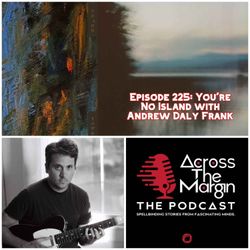Share

Across the Margin: The Podcast
Episode 163: Steven Bernstein & Sexmob's The Hard Way
This episode of Across The Margin: The Podcast presents an interview with musician trumpeter, slide trumpeter, arranger/composer and bandleader from New York City, Steven Bernstein. Steven is best known for his work in The Lounge Lizards, Sexmob, Spanish Fly, and the Millennial Territory Orchestra. He has released four albums under his own name on John Zorn's Tzadik Records and he has performed with jazz giants including Roswell Rudd, Sam Rivers, Don Byron, and Medeski, Martin & Wood, as well as musicians ranging from Aretha Franklin to Lou Reed, from Linda Ronstadt to Digable Planets, from Sting to Courtney Love. Steven was a member of Levon Helm's Midnight Ramble band, playing in Helm's Woodstock home, as well as touring with the band. As an arranger he has written for Bill Frisell, Rufus Wainwright, and Elton John, just to name a few. He has composed for dance, theater, film and television, and with composer John Lurie, arranged the scores to many feature films, including Get Shorty. While Steven is prolific with his output, this episode centers on two of his projects, Sexmob, which just released a terrific new album called The Hard Way, and The Millennial Territory Orchestra, which recently released four excellent records, in one day, on the Royal Potato Family label. Sexmob’s latest release is a bit of a departure for the band, as with producer Scotty Hard at the board, The Hard Way skews decisively electronic. On it, Hard’s beats and soundscapes provide Steven, saxophonist Briggan Krauss, bassist Tony Scherr and acoustic/electric drummer Kenny Wollesen, all the stimulus they need for further compose and fearlessly reinvent. With each offering, and certainly with The Hard Way and its rich electro-acoustic groove canvas, Steven and crew reveal a modernizing impulse, but also an equally strong foundation in the roots of jazz and American song. Funky, bluesy, with a tattered dissonance conjured up by Krauss Throaty saxophone tone, the distinctive wail of Steven’s rare horn, and the swagger of Scherr and Wollesen’s rhythm section grind, Sexmob continues to chart new paths in 21st-century creative music. In this episode host Michael Shields and Steven Bernstein talk about Sexmob’s new direction sonically found on The Hard Way while exploring the production process behind this captivating work of art. They converse on producer Scott Hard’s influence on the album, the unique art house label that The Hard Way was released on called Corbett vs. Dempsey, and the four albums Steven recently released with The Millennial Territory Orchestra. They even discuss Sexmob’s forthcoming tour with Laurie Anderson, the many “gifts” Steven received in his career from renowned producer Hal Willner, and so much more.
More episodes
View all episodes

Episode 229: On Healing Land, Birds Perch with Naja Lockwood
28:46|This episode of Across The Margin : The Podcast features an interview with director Naja Lockwood. Naja has executive produced multiple documentary and narrative films focusing on social justice and is the founder of RYSE Media Ventures which supports stories of diverse voices. Born in Vietnam, Naja immigrated to Massachusetts during the Fall of Saigon. As a refugee, Naja continues to advocate for immigrants from her undergraduate years to her current work with the Governor's Workforce Services. She serves on the Committee for Ethnic Studies and Asian American Studies at Harvard University and The Coalition for Diverse Harvard. She is the Founder and CEO of Naja Lockwood Designs which supports female artisans of Southeast Asia. She is the director of “On Healing Land, Birds, Perch,” which is the focus of this episode. “On Healing Land, Birds Perch (Đất Lành Chim Đậu)” tells the stories behind the iconic photograph taken by Eddie Adams during the 1968 Tet Offensive titled “Saigon Execution.” The film presents an opportunity to delve into the complex narratives and the lasting impact of a single moment captured in time. The photograph of General Nguyen Ngoc Loan executing a Viet Cong officer, Nguyen Van Lem, has become a powerful symbol, often viewed as emblematic of the brutality of the Vietnam War. However, it also represents much more than the act of violence it depicts. It reflects the personal stories, struggles, and the human costs of war for generations that continue to reverberate today.Watch “On Healing Land, Birds Perch” here!
Episode 228: What Do You Do When You're Lonesome with Jonathan Bernstein
52:57|This episode of Across The Margin : The Podcast features an interview with Jonathan Bernstein, a senior research editor and writer at Rolling Stone, who before that was a freelancer for Oxford American, The Guardian, GQ, Vulture, Pitchfork, The Village Voice, Spin, Entertainment Weekly, and American Songwriter. His book, What Do You Do When You’re Lonesome : The Authorized Biography of Justin Townes Earle, is the focus of this episode. In What To Do When You’re Lonely, Jonathan Bernstein, with the full cooperation of the Justin Townes Earle estate, unravels a short but incredibly creative life, and reveals the backstories behind Justin’s greatest songs and what happened when it all fell apart while also capturing a shadow world of the neglected children of Nashville legends who wrestle with the legacies of their hard-living, road-weary, often absent parents.
Episode 227: Michael Townsend's Secret Mall Apartment
34:37|This episode of Across The Margin : The Podcast features an interview with artist and educator Michael Townsend. Michael is the founder of the Tape Art movement and for over 30 years, he has created hundreds of ephemeral murals and community projects around the world. His work includes the 9/11 Hope Project, the invention of the BOOM! Projector, and the now-legendary documentary Secret Mall Apartment. Directed by Jeremy Workman and executive produced by Jesse Eisenberg, the critically acclaimed documentary follows Michael and his collaborators, who, in 2003, secretly built and lived in an apartment inside Providence Place Mall for four years. What started as an underground protest against gentrification has become a cultural phenomenon, a story about art, resistance, and community. At the center of the film is Michael Townsend, the artist whose work sparked the story. Michael has found a way to live his art, and give back to his community and the country all the while, from teaching collaborative drawing in hospitals and schools, and building projects designed to disappear physically but endure culturally. The mall apartment was one project among many — a piece of protest art that happened to be documented, and in this episode host Michael Shields and Michael Townsend delve into Michael’s motivations, his enduring and inspiring work with Tape Art, the blended line between art and everyday living that defines Michael’s life, and so much more.
Episode 226: Plan C For Civilization with Ben Kalina
35:41|This episode of Across The Margin : The Podcast features an interview with award-winning director and producer Ben Kalina, whose work centers on the collision between human nature and the force of nature. In 2020 he produced and directed Can We Cool the Planet? for NOVA. His film Shored Up, the 2014 Sundance Institute LightStay Sustainability Award winner, explored rising sea levels and the politics of Climate Change in the U.S. in the aftermath of Hurricane Sandy. He was Associate Producer of A Sea Change, broadcast on Discovery’s Planet Green in 2009, and Two Square Miles, broadcast on PBS’ Independent Lens in 2006. Ben’s production company, Mangrove Media, is based in Philadelphia where he is an Assistant Professor in the Film and Television Program at Drexel University. His latest documentary — Plan C For Civilization — is the focus of this episode. Plan C for Civilization tackles the promise and peril of solar geoengineering with exclusive verite access to its protagonist David Keith and the SCoPEx project as well as the rogue geoengineers of Make Sunsets. From Bangladesh to Nevada, the extremely controversial promise of solar geoengineering is emerging after more than 60 years in the shadows, and with it, a new chapter of the Climate Change saga.
Episode 225: You're No Island with Andrew Daly Frank
33:03|This episode of Across The Margin : The Podcast features an interview with singer-songwriter and guitarist Andrew Daly Frank. Andrew is an inimitable songwriting voice and virtuosic guitarist, and his debut album, You’re No Island — the focus of this episode — is a gorgeous, affecting piece of art that is pacifying and vitalizing. Andrew is a guitarist who has lent his thrilling leads and delicate chordal touch to albums by Charlie Kaplan and released a series of beguiling EPs in the lead up to You’re No Island. Andrew’’s arrangements on You’re No Island are both intimate and expansive, and he emerges here as an auteur in his own right, a songwriter of uncommon wisdom and an architect of subtle musical effects. In this interview host Michael Shields and Andrew Daly Frank discuss the genesis of You’re No Island and the ways in which the songs on it took shape over the past five years. They talk about the cunning lyricism found on the album, Andrew’s musical influences, and so much more. Songs featured in the episode: “Alone in the Frame,” “Someone Somewhere,” “Lisbon.”
Episode 224: The 90s Jam Band Explosion with Mike Ayers
56:35|This episode of Across The Margin : The Podcast features an interview with author and seasoned music and culture journalist, Mike Ayers. Mike has had work published in Billboard, The Wall Street Journal, Rolling Stone, Time, Esquire, and Relix. His first book, One Last Song: Conversations on Life, Death, and Music came out in 2020, with Variety declaring it as one of the best music books of the year. His latest book, Sharing in the Groove: The Untold Story of the '90s Jam Band Explosion and the Scene that Followed, is the focus of this episode Sharing in the Groove is a rich examination of an underdog genre that helped define the 1990s musical landscape — a scene that paved the way for modern-day cultural institutions such as the Bonnaroo Music Festival and kept the Grateful Dead ethos alive. Beginning in the mid-’80s and traveling up to New Year’s Eve 1999, Sharing in the Groove covers milestones such as getting signed to record labels and working the club scenes to playing amphitheaters and arenas. Along the way, details emerge of the scene’s own cultural values and the desire to be unique in a world that wanted them to follow a prescribed path. Ultimately, it’s a DIY story of creativity and making music — and how that won over a huge audience. Filled with anecdotes and stories directly from the musicians, promoters, managers, roadies, producers, label executives, and fans who lived this scene, Sharing in the Groove is a fun, fast-paced oral history that will appeal to music lovers everywhere.
Episode 223: Keep The Line Open with Joe Alterman and Mocean Worker
50:28|This episode of Across The Margin : The Podcast features an interview with bassist/producer Mocean Worker (aka Adam Dorn) and pianist/composer Joe Alterman, who have come together for Keep The Line Open, a funky, feel-good tribute to the late soul jazz legend Les McCann. Keep The LIne Open remarkably taps into the genre-blurring spirit that defined McCann’s music, as well as his influence on Joe and Adam. Both Joe and Adam called Les McCann a friend, collaborator, and mentor. Joe was a devotee of Les who had the rare opportunity to open for his hero, and later craft songs with him. Adam met Les through his dad, Joel Dorn, who produced several Les records for Atlantic Records, including the iconic Swiss Movement. Adam and Joe created Keep The Line Open by melding sampling with live instrumentation to pay homage to an era when the groove reigned supreme and the vibe was decidedly danceable. It’s a super fun and funky sonic journey designed to sound like it was captured at a jazz club circa 1964. Learn all about it and more in this episode.
Episode 222: Organize or Burn with Fabian Holt
48:49|This episode of Across The Margin : The Podcast features an interview with Fabian Holt, Associate Professor in the Department of Communication and Arts at Roskilde University. He is the author of Everyone Loves Live Music: A Theory of Performance Institutions. His latest book, Organize or Burn : How New York Socialists Fight For Climate Survival, is the focus of this episode. Climate inaction is already causing widespread suffering and devastation around the world. How can citizens take collective action? Fabian Holt argues that we must go beyond protest and direct action, and turn to the potential of hybrid organizations that bring together social movements and political parties. One such “movement party” with recent political success is the New York City chapter of the Democratic Socialists of America (NYC-DSA), which has become the city’s main organization for movement climate politics, running multi-year climate pressure campaigns and a slate of climate-focused electoral campaigns, Organize or Burn situates the NYC-DSA in the history of the Democratic Socialist movement in the United States, In it, Fabian contests that NYC-DSA has developed a distinct approach to political organizing that has broad relevance to citizen climate mobilization. Ultimately, Organize or Burn shows that NYC-DSA can offer powerful lessons in how political collective action can be meaningful in the present moment of political turbulence.
Episode 221: The Song That Changed Our Lives with Rick Korn
31:02|This episode of Across The Margin : The Podcast features an interview with film and TV producer, writer, and director Rick Korn. Rick is the co-founder of In Plain View Entertainment which specializes in creating socially conscious documentaries. Rick has produced benefit concerts with Bruce Springsteen, Bon Jovi, Sheryl Crow, Peter Frampton, Kevin Bacon, and Joan Jett (amongst others). He executive produced the documentary about Paul McCartney, My Old Friend, and in 2024, he directed and released A Father’s Promise, the inspiring story of professional musician Mark Barden who lost all joy in music when his son Daniel was murdered at Sandy Hook Elementary school. Mark rewired himself and became a powerful voice and activist when he co-founded Sandy Hook Promise. Rick’s latest documentary, the focus of this episode, is entitled Harry Chapin — Cat's In The Cradle: The Song That Changed Our Lives. This new documentary explores Harry Chapin’s deeply affecting folk song’s lasting impact on music and culture decades later. In it, reflecting on the song's universal themes of parenthood, time, and relationships, are legendary musicians Billy Joel, Pat Benatar, Judy Collins, Dee Snider (Twisted Sister), Darryl McDaniels (Run-D.M.C.), Mandy Patinkin, Robert Lamm (Chicago), Whitfield Crane (Ugly Kid Joe) and more. In this episode host Michael Shields and Rick discuss what it is about “Cat’s In The Cradle” that has affected generations of people from across the world so deeply. Join in on a celebration of Harry Chapin who was more than just a singer-songwriter; he was a storyteller, activist, and humanitarian whose life and music touched the hearts of millions.The documentary will benefit WhyHunger, Long Island Cares and the Harry Chapin Foundation.